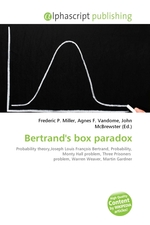Bertrands box paradox
Frederic P. Miller, Agnes F. Vandome, John McBrewster
бумажная книга
High Quality Content by WIKIPEDIA articles! High Quality Content by WIKIPEDIA articles! Bertrand's box paradox is a classic paradox of elementary probability theory. It was first posed by Joseph Bertrand in his Calcul des probabilites, published in 1889. There are three boxes: a box containing two gold coins, a box with two silver coins, and a box with one of each. After choosing a box at random and withdrawing one coin at random that happens to be a gold coin, it may seem that the probability that the remaining coin is gold has a probability of 1/2; in fact, the probability is actually 2/3. Two problems that are logically equivalent are the Monty Hall problem and the Three Prisoners problem.
Данное издание не является оригинальным. Книга печатается по технологии принт-он-деманд после получения заказа.


